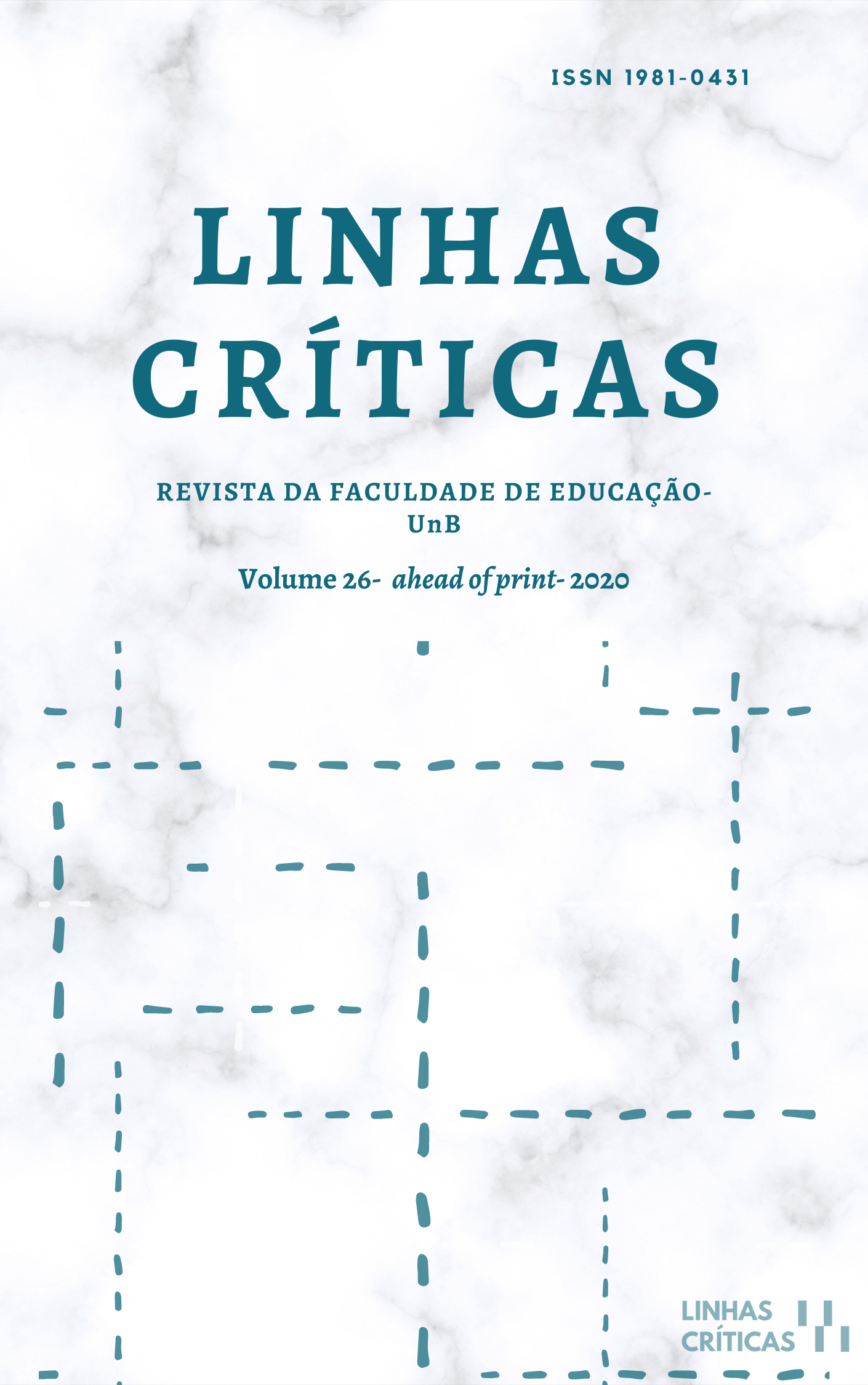Thinking about online education teacher in times of cyberculture
DOI:
https://doi.org/10.26512/lc.v26.2020.30960Keywords:
Online education, Digital culture, Teacher training, Teaching practices, Educational technologyAbstract
This article is an excerpt from my doctoral thesis in education with a focus on the human / professional / teacher inserted in Online Education, with a view to the issues of the formation of teachers in the appropriation of new digital information and communication technologies (TDIC), in the perspective of postmodernity in the middle of cyberculture. We seek to theoretically discuss the teacher of online education from traditional teaching, who is challenged in his teaching-learning practice and feels the impacts of the gaps in his education, calling on everyone involved in this process to rethink new training practices that he takes into account, reflection, critical sense and humanism.
Downloads
References
Almeida, M. E. B. (2002). Incorporação da tecnologia de informação na escola: vencendo desafios, articulando saberes, tecendo a rede. En: M. C. Moraes (Org.). Educação a distância: fundamentos e práticas. UNICAMP/NIED.
Bauman, Z. (2001). Modernidade líquida. Zahar.
Bauman, Z. (2013). Sobre educação e juventude. Zahar.
Belloni, M. L. (2001). O que é mídia-educação. Autores Asociados.
Castells, M. (2009). A sociedade em rede. v. 1. 10º Ed. Paz e Terra.
Castells, M., & Cardoso, G. (Org.). (2005). A sociedade em rede: do conhecimento à ação política. http://www.cies.iscte.pt/destaques/documents/Sociedade _in_Rede_CC.pdf
Contreras, J. (2002). A Autonomia de professores. Cortez.
Dewey, J. (1979). Como pensamos: como se relaciona o pensamento reflexivo com o processo educativo - uma reexposição. 3. ed. Companhia Editora Nacional.
Giroux, H. (1992.) A escola crítica e a política cultural. Cortez-Autores Associados,
Habowski, A. C., & Conte, E. (2018). Cultura digital versus autoridade pedagógica: tendências e desafios. Linhas Críticas, Brasília, DF, 24, e 18993. https://doi.org/10.26512/lc.v24i0.18993
Kenski, V. M. (2003). Tecnologias e ensino presencial e a distância: práticas pedagógicas. Papirus.
Lemos, A. (2015). Cibercultura: tecnologia e vida social na cultura contemporânea. Meridional.
Lévy, P. (2010). Cibercultura. Editora 34, 3º edição.
Lopes, M. C. L. P. (2009). Formação tecnológica do professor em uma sociedade digital: desafios e perspectivas. Cuiabá: EDUFMT, Revista Polifonia, 17,165-174. http://cpd1.ufmt.br/meel/arquivos/artigos/312.pdf
Martinho, L. M. S. (2015). Teoria das mídias digitais: linguagens, ambientes, redes. Vozes.
Moraes, M. C. (Org.). (2002). Educação a distância: fundamentos e práticas. Unicamp/NIED.
Moran, J. M. (2003). Contribuições para uma pedagogia da educação online. En: M. Silva (Org.). Educação online. Loyola.
Morin, E. (2004). Os sete saberes necessários à educação do futuro. 9. ed. Cortez; UNESCO.
Pimenta, S. G. (2006). Professor Reflexivo: construindo uma crítica. pp. 17- 52. En: S. G. Pimenta & E. Ghedin (Org.). Professor Reflexivo no Brasil: gênese e crítica de um conceito. 4. ed. Cortez.
Santaella. L. (2010). Intersubjetividade nas redes digitais: repercussões na educação. En: A. Primo (Org.). Interacciones en red. Sulina.
Schön, D. (1995). Formar professores como Profissionais Reflexivos. En: A. Nóvoa. (Ed.). Os professores e a sua formação. Nova Enciclopédia.
Silva, M. (2000). Sala de aula interativa. Quartet.
Silva, M. (2003). Educação online. Loyola.
Silva, M. (2010). Educar na cibercultura: Desafios à formação de professores para a docência online. Revista digital de tecnologias cognitivas, PUC-SP, n. 3, jan./jun.
Silva, M. (2018). De Anísio Teixeira à Cibercultura: desafios para a formação de professores ontem, hoje e amanhã. Boletim Técnico do SENAC, v. 29 (3), pp. 30-41.
Silva, T. T. (2000). Documentos de identidade: uma introdução às teorias do currículo. Autêntica.
Published
How to Cite
Issue
Section
License
Copyright (c) 2020 Joaquim Sérgio Borgato, Maria Cristina Lima Paniago, Erla Mariela Morales-Morgado

This work is licensed under a Creative Commons Attribution 4.0 International License.
Authors who publish in this journal agree to the following terms:
-Authors maintains the copyright and grants the journal the right of first publication, the work being simultaneously licensed under the Creative Commons Attribution License which allows the sharing of the work with recognition of the authorship of the work and initial publication in this journal.
- Authors are authorized to enter into additional contracts separately, for non-exclusive distribution of the version of the work published in this journal (eg publish in institutional repository or as a book chapter), with acknowledgment of authorship and initial publication in this journal.
-Authorers are allowed and encouraged to publish and distribute their work online (eg in institutional repositories or on their personal page) at any point before or during the editorial process, as this can generate productive changes as well as increase the impact and the citation of published work (See The Effect of Free Access).



